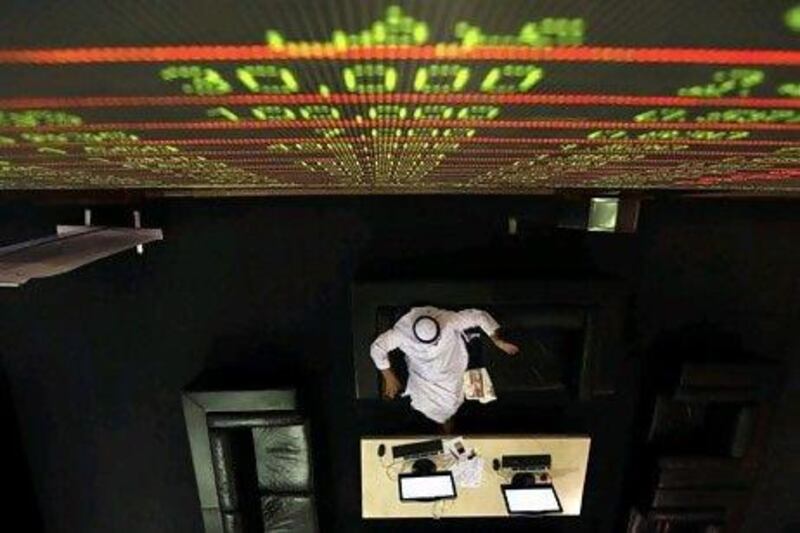Since January, trading ON Dubai's stock-market has been gaining momentum. Nearly a year after the Arab Spring and the euro-zone debt crisis dampened investor sentiment, the Dubai Financial Market (DFM) General Index has outperformed other Gulf markets, up more than 12 per cent so far this year.
Traded value in Dubai has reached Dh300 million per day on average, compared with Dh120m during the same period last year.
Most of this money is from retail investors in the UAE and the wider GCC, said Anastasios Dalgiannakis, the head of trading at Mubasher Financial Services in Dubai. "Foreign and institutional funds are not active players still," he added.
The improvement in liquidity bodes well for brokers after 45 securities companies closed last year. The number of financial services companies operating in the country has dropped from 103 at the beginning of last year to 55.
"For the surviving brokerages, it's a breath of fresh air to see that volumes are coming back," Mr Dalgiannakis said.
But markets could easily reverse their track if Europe's debt crisis worsens or geopolitical issues heighten, said Wadah Al Taha, the chief investment officer at Al Zarooni Group, an investment company based in Dubai.
Global markets surged on Friday after Germany signalled that Greece would get a second bailout when finance ministers meet tomorrow in Brussels. The S&P 500 Index rose 0.2 per cent to 1,361.23, trading near its two-year high of 1,363.62. The Dow Jones Industrial Average rose 0.4 per cent to 12,949.87.
"I am not comfortable," Mr Al Taha said. "There are still factors that could trigger the same sell-off again, and retail investors are more emotional in their decision-making than institutional investors."
Rakan Himadeh, a senior analyst at Al Mal Capital in Dubai, said equity markets, which slumped last year, are ignoring continued risks.
"It's worrying. Markets don't seem to care right now, but it'll eventually catch up with them," Mr Himadeh said.
Oil on Friday rose to its highest level this year amid expectations that supplies would tighten.
Iran is threatening to blockade the Strait of Hormuz. The EU plans to impose an embargo on Iranian oil this summer. US crude rose 93 cents to US$103.24 per barrel in New York. The benchmark's previous high came on January 4, at $103.22.
Last year was a dire one for local stock markets. The Abu Dhabi Securities Exchange General Index and the DFM General Index lost 11.6 per cent and 16.9 per cent, respectively. Traded value on the exchanges plummeted 45 per cent to Dh57 billion last year, causing many foreign investment banks to restructure their operations in the UAE to cope with declining business.
Germany's Deutsche Bank recently moved its head of equity capital markets back to London from Dubai. Nomura, based in Tokyo, closed its Dubai equity research unit and the UK's HSBC has shut its retail brokerage unit in the Emirates.
Egypt's stock market, among the top-performing markets globally, rose 1.5 per cent to 4,967.15, bringing its total advance to date to 37.1 per cent since January 1.
Investor sentiment improved after the country completed its parliamentary elections.
Investors will be eyeing the following corporate events from Egypt this week:
Tomorrow, Mobinil, the company also known as Egyptian Company for Mobile Services, is expected to report its annual financial results.
On Wednesday, the country's biggest publicly traded bank, Commercial Bank International, and the fixed-line monopoly Telecom Egypt will report their full-year earnings.
On Thursday, Egypt's biggest publicly traded contractor, Orascom Construction Industries, will report its full-year results.
Elsewhere in the region, Kuwait's measure rose 2 per cent to 5,982.20 for the week, Bahrain's advanced 0.6 per cent to 1,143.77, Oman's MSM 30 Index added 0.5 per cent to finish the week at 5,653.51, and Qatar's QE Index declined 1.6 per cent for the week to close at 8,544.18. The Saudi Tadawul All-Share Index 0.2 per cent to 6,830.31 yesterday.
twitter: Follow our breaking business news and retweet to your followers. Follow us






